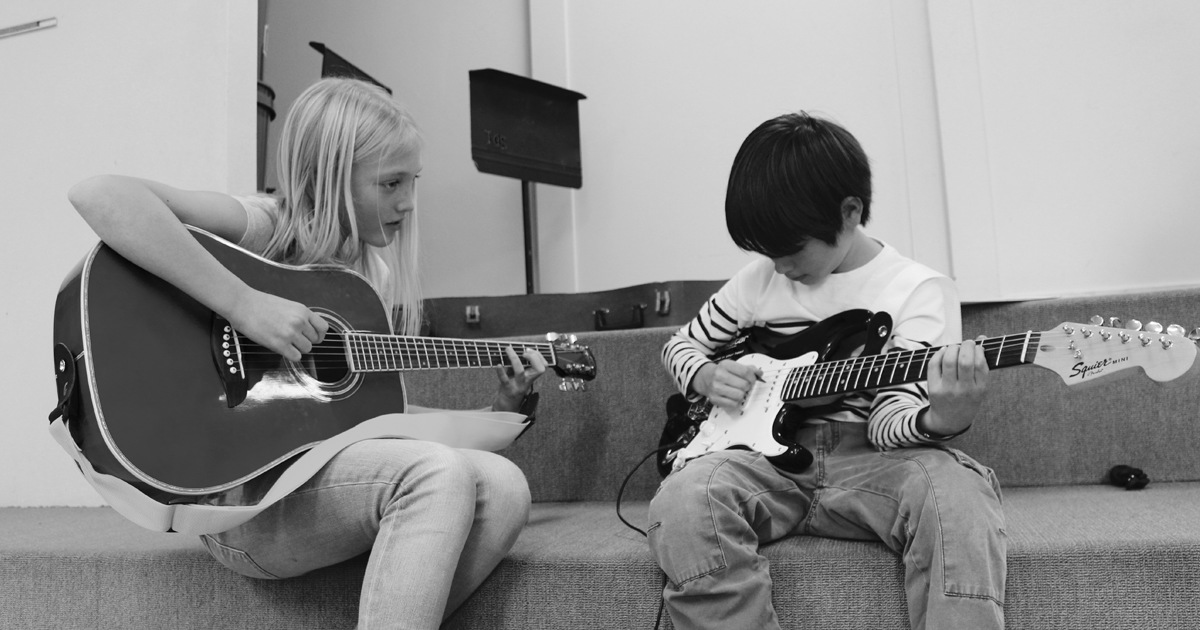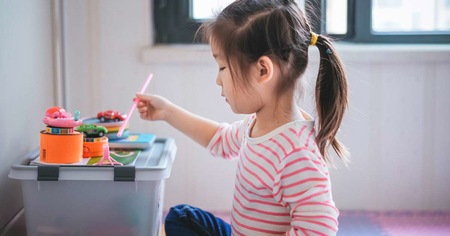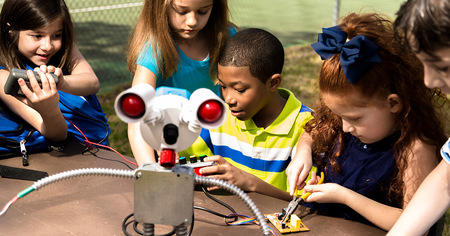As an afterschool music provider, I have the privilege of witnessing the power of music education on a day-to-day basis. Whether I am watching a group of individuals gel into a cohesive unit as they lock into a drum groove for the first time or listening to a fresh new composition by two students working together as songwriters, my afternoons are peppered with brief moments of magic.
In an age of deep division and rising social inequality across the country, music has the power of bridging the gap between class, race and gender. I am the founder of the Rock Dojo in Portland, Oregon, and I can tell you from experience: Music has the power to change the world.
Following are three ways to integrate the values of music education into your program and harness the power of rock music to cultivate minds, ignite imaginations and bring young people together.
I. Collaboration
I hate to admit it, but I sing like a yowling cat on a hot summer night—which is more common than you might suspect among rock guitarists. In other words, most guitarists need singers like superheroes need sidekicks. Jimmy Page had Robert Plant, Keith Richards got Mick Jagger, Slash had Axl Rose.
Sure their feuds were legendary. But when they worked together, the whole was greater than the sum of its parts. Each musician brought his unique talent to the table, and together they made magic.
Next time you organize an activity, make it a collaboration among young people—especially kids who otherwise might not socialize together. Who knows? Maybe they'll create a timeless classic.
II. Creativity
Music contains its own inner logic, and each musical style has its own symmetry, rules and formulas. Of course, rock musicians have been bending—sometimes even breaking—the rules since Chuck Berry dazzled audiences with his double stops and duckwalks, so encourage creative flexibility within activities.
For example, whenever I share a new activity with kids, I let them know the formula is a starting point. If they follow the formula, they will create a song that sounds good, because the formulas have worked for nearly 60 years. On the other hand, some of the greatest rock songs of all time broke all the rules. Just think of Queen's seven-minute masterpiece, "Bohemian Rhapsody." It begins as a sentimental ballad, morphs into a mock-opera mid-section and ends as a hard-driving rock anthem.
Next time you start an activity with kids, provide clear directions, but encourage them to use their imaginations, flex their creative muscles and express themselves.
III. Passion and Joy
Playing the electric guitar is like petting a wild tiger. Sure, its fur is velvety warm against your skin; but deep down, you know that tiger, a creature of stunning beauty and terrible power, can turn around and maul you in a second. Yet for that moment—when the guitar is in your hand and you're harnessing all that power and fury at your fingertips—everything fades away, and you become an expression of pure joy.
That's the power of electric guitar. But it's not the guitar's alone. When you bring pure joy for your subject into the program, kids can feel it. That level of energy inspires and invigorates their own learning, pushing them to further heights and greater feats.
Take a moment and reflect on your past: What inspired you to become an afterschool provider in the first place? Once you have the answer, build on that emotion.
For me, it was the first time I held a guitar, at the tender age of 26. It was like falling in love. I knew at that moment, I would spend the rest of my life playing, teaching and studying the guitar. As an instructor, I conjure that experience and tap into that emotion every time I walk into a program, lead a workshop or teach a private lesson.
As you begin integrating creativity, collaboration and passion into your classroom, you'll harness the power of rock music to cultivate minds, ignite imaginations and bring students together.
In other words, you'll be changing the world.
Brian Parham is the founder of the Rock Dojo in Portland, Oregon, where he teaches hundreds of kids between the ages of 6 and 12 to play, perform,and compose their own original rock instrumental music. He is also the author of The Ultimate Rock Guitar Dojo for Kids: White Belt Edition. Conctact him at bparham79@gmail.com.




